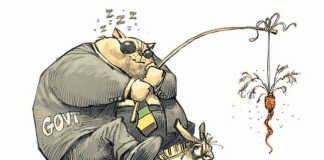I was naive to think that violent strikes would never happen to farmers. With the present unsettled state of national politics, if it didn’t take place sometime, somewhere, I was living in a fool’s paradise. It’s going to give the whingers in our midst a field day, but there’s no time to listen to them. We need to do our best to stop this happening again.
But before we decide how to tackle this challenge, let’s stop for a reality check. Did we honestly think that when the ANC came into power, nothing would change? That the privileges bestowed on certain sections of our population would continue unabated? As long as this country is a democracy, demographic forces mean that the government will be dominated by black Africans, and the values and aspirations of the majority will drive government policies.
With our history, how could there possibly have been any other outcome in this country? The miracle is that we had no real war, like Zimbabwe or Namibia. So, despite the uncertainties, we have much to be grateful for. Now what? Obviously, we need to make sure our businesses stay profitable. But we also need to lend government a hand in making South Africa a success. This, I believe, has little to do with clever business techniques.
Rather, it depends on building sound relationships and trust between ourselves, our employees and government. Let’s have a closer look at what it means. To begin with, we need to recognise that this is now a truly African country, run by a truly inclusive African government, warts and all. And this is not going to change. Those who haven’t yet realised this fact need to come to terms with it, and become a positive force. Otherwise, please keep away from me and my fellow farmers.
To be frank, if I have any despondency about the future of South Africa, it’s about the attitudes of those who are super-critical or downright racist. By now, we must surely know that the old South Africa is gone and that we live in Africa, with all its faults and its many wonderful opportunities.
Caring
At a personal level, though, I find myself asking what I should do to avoid a De Doorn’s experience on my farm. How can I, as an individual, ensure that I never have to face anarchy like that experienced recently in the Western Cape? John Rance, director of Rance Timbers, a 66-year-old Eastern Cape-based business, tells a story which, in my opinion, encapsulates the secret. During the bad old days of apartheid, John, a young student at the time, was driving his father Jack to a sawmill in Stutterheim. It was raining, and as they passed a fellow on a bicycle, the car wheel splashed muddy water onto him.
“Now why did you do that?” Jack asked. “Do what?” John replied, not even realising what had happened. “Stop the car,” said Jack. He made John turn around and apologise to the cyclist. He then told his son that every single person, and especially the poor and downtrodden, were entitled to respect. That if genuine, sincere respect were given, it would be returned with interest.
This lesson is the key to building sound relationships.
Genuine respect, given liberally and consistently, to every person, no matter their station in life, is the foundation of trust, and as Stephen Covey in his book The Speed of Trust demonstrates, “trust changes everything”.
Patience
As we grapple with our jobs in this new environment, there’s another important attitude shift required, one exemplified by UCT vice-chancellor Dr Max Price. When facing criticism about using race in university selection policy, he said: “For a student in a township school to obtain 60% in a Grade 12 exam requires a degree of commitment and raw talent that far exceeds that needed by a student achieving the same result at a private school who has the cards stacked in his or her favour.”
This is certainly not to say that you need to accept lower standards from anyone. But you’ll have to be more patient in getting these standards from some than from others. As Arnold Mol has taught in his motivation programmes: ‘Stay tough on standards, but soft on people.’
And being ‘soft on people’ means more than giving some people additional time to learn their jobs. It means getting to know them personally – their family set-ups, their aspirations, and their frustrations. Having farmed in Swaziland for many years, where family names are such a source of pride, I’m amazed by the fact that South African employers often don’t know the surnames of their employees, or if they do, cannot pronounce them correctly. Any good manager will know not only the names of workers, but also the names of their wives and kids, and will be genuinely interested in their well-being.
Fair wages
If a sound relationship between management and workers is the bedrock of a stable, profitable business, salaries are surely the foundation. And common sense should tell us that if our workers are mired in grinding poverty, it’s virtually impossible to continue building a good relationship with them and ensure quality work and commitment. Do you know what the so-called ‘living wage’ is in your area? If not, it’s quite easy to establish.
We did it by determining the cost of a basket of items that we considered an average family needed to live a decent life – housing, food, schooling, medical, transport, housing, services and so on – and were shocked to find that at the lower levels we were not paying enough for people to live respectably. We fixed it as soon as we could. Yes, it cost us, but it was undoubtedly worth it.
Talking to a leading farmer in De Doorns, he is quite adamant that, whatever other forces might have been involved in the unrest, labour rates are too low, and it’s essential that these are lifted. Living costs have risen, and his employees have to earn more. He’s determined to find a way to do it.
Of course, there are many other factors under the control of management that create an environment in which it’s easy to stoke unrest. Poor on-the-job safety measures, unfair wage differentials such as women being paid less than men for the same job, poor disciplinary procedures, housing with no electricity, lack of clean water, sewage or refuse removal, lack of transport, bad health and education services and so on. All these detract from living a decent life, and all are capable of being improved by management – many at little or no extra cost.
De Doorns has been a warning to all farmers in South Africa. We need to pay a decent living wage. We need to be concerned about the quality of life of our employees and their families, and do our damnedest to make good profits so that we can afford to give them the material necessities of a decent life. But underpinning it all, we need to develop the correct attitudes. If these are wrong, no amount of pay will bring lasting peace and harmony to our farms.
The views expressed in our weekly opinion piece do not necessarily reflect those of Farmer’s Weekly.













